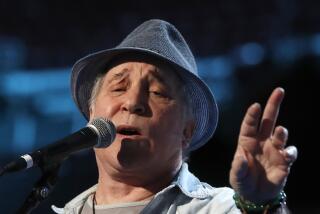Limbaugh Gets Hopeful Prognosis
- Share via
WASHINGTON — Thanks to experimental drugs and cutting-edge technology, Rush Limbaugh will likely not go deaf and will continue to host his talk-radio program, his doctors and a spokesman for his show said Thursday.
At the House Ear Clinic and Institute in Los Angeles, the specialists treating Limbaugh for the sudden and profound hearing loss he announced Monday explained the cause and treatment of his deafness, a rare condition called auto-immune inner ear disease, or AIED.
“It’s something akin to arthritis of the inner ear,” an inflammation that occurs in only about 1% of patients losing their hearing, said Dr. Jennifer Derebery, one of the House Institute specialists treating Limbaugh.
Limbaugh broadcasts his show from New York and his home in Florida, but is being treated in L.A.
The doctors believe Limbaugh’s own immune system is attacking the fine hairs in the inner ear that convert vibrations to electrical impulses, which the brain then deciphers as sounds. They’re treating the problem with the same drugs used to treat rheumatoid arthritis or cancer.
“This is an active area of investigation right now,” said Dr. Michael Weisman, director of the rheumatology department at Cedars-Sinai in Los Angeles. Researchers there and at the House Institute “are participating in a very large government-funded trial of medications for this disease. So your tax dollars are funding our efforts to be able to find out what causes this problem and how to treat it.”
Limbaugh is not part of that trial, which was already in progress, but his doctors are using the medications being tested to treat his condition. They include prednisone, a powerful steroid, and methotrexate, a chemotherapy drug.
Limbaugh announced on his show Monday, heard locally from 9 a.m. to noon weekdays on KFI-AM (640), that he first noticed his hearing loss May 29, and that it has worsened rapidly since then, to the point where he’s deaf in his left ear, and has only 20% of his hearing remaining in his right.
“It may be a coincidence that his better hearing ear is on the right,” Derebery joked. The use of the medications may stem the hearing loss and possibly even reverse it somewhat. In that case, hearing aids should amplify sound enough for Limbaugh to hear, the doctors said. They’ll need to wait four to eight weeks to determine if the medication will work.
If the drugs do not halt his hearing loss and Limbaugh goes deaf, the doctors said they will turn to cochlear implants to restore his hearing. The House Institute did pioneering work on the implants, first available about 20 years ago. They are attached to the skull and transmit sound directly from the environment to the brain.
Limbaugh’s medical condition has not deflated any of the conservative host’s trademark bombast.
“I am the most listened-to talk-show host in America, and I intend to stay that way,” he said during his show Tuesday. And he added on Thursday: “I’m not going to quit until every American agrees with me. And I’m not going to pull that off until I’m at least 66, 67.” The talk-show host is 50.
Limbaugh’s show is broadcast to about 600 stations and 20 million listeners a week. He uses his program as a daily shooting gallery targeting the Clintons, feminists, environmentalists, peace activists and liberals or moderates. In style, Limbaugh is legendary for unleashing oral fusillades of well-honed scorn, derision, bemusement and exasperation on anything veering from what he defines as “The Way Things Ought to Be,” also the title of one of his books.
Kraig T. Kitchin, president of Premiere Radio Networks, which distributes Limbaugh’s show, said Limbaugh received 30,000 supportive e-mails in the first two days after his hearing loss announcement. Many in his core audience, sometimes known as “dittoheads,” describe themselves as “angry white males.”
The doctors said Thursday that Limbaugh’s rapid hearing loss is not related to high doses of Vicodin or other painkillers, a phenomenon House Institute researchers have been studying and announced last month.
After first telling his listeners of his condition, Limbaugh turned philosophical. “I’ve been luckier than most people will ever be in life. I can retire if I wanted to and not suffer,” he said. “Look, there are a lot of people worse off than I am, especially since September the 11th. This is just one of those things that happens.”
Doctors said they’ll carefully watch for potential side effects of the medications they’re giving Limbaugh, including osteoporosis, damage to his liver, lungs and bone marrow, and the worsening of his mild Type 2 diabetes.
When Limbaugh disclosed his problem Monday, he was vague about the cause and about what techniques or technologies he and his staff were using to work around his hearing loss. Kitchin said the host had wanted to wait until after Wednesday, when he met again with his doctors to nail down specifics of his condition and treatment.
In addition to listening through his hearing aid, Limbaugh is using “real-time transcription” to show him what the callers are saying, and his staff is also using adjectives and color-coding on the computer screen to convey the caller’s mood, in addition to his words, Kitchin said.
With ever-improving technology such as voice-recognition software that can convert speech to text, there’s no reason Limbaugh would need to stop taking callers, said Ken Mueller, radio curator at the Museum of Television & Radio. Even without the six to 12 calls he usually takes during the three-hour show, the program wouldn’t be much different.
“The show is not about the callers. They’re there to give the host something to bounce off of. Rush’s show is about Rush, and he’s very honest about that,” Mueller said. Limbaugh signed a nine-year, $285-million contract with Premiere in July, and Kitchin said neither side knew the seriousness of the host’s medical problem at the time. He insisted that would not have changed Premiere’s position, however, and it is committed to carrying him through 2009.
Limbaugh started his show in Sacramento in 1985, and went national in 1988. His exploding popularity led to a revival of AM radio, and an explosion in the talk-radio format, Mueller said. Using his nationwide pulpit, Limbaugh also gave voice to the Republican revolution of 1994, when Newt Gingrich and his Contract With America retook Congress from the Democrats, he added.
“He’s one of the biggest names on radio,” Mueller said. Premiere has “a lot of money invested in him. They’re going to do whatever they have to to keep him on the air.”
And for the 28 million Americans who are deaf or hard-of-hearing, Limbaugh may even become a role model, said Dr. Merri C. Pearson, director of the National Center on Deafness at Cal State Northridge. Or at least an example of someone successfully dealing with the same issues they might be, such as Christopher Reeve and spinal-cord injuries, or Michael J. Fox and Parkinson’s disease.
“I don’t think it will guarantee they’ll agree with his political views. It depends on what he does next,” she said. “I do hope it creates a sensitivity with his listening audience.”
She said the center has a videotape library of prominent people in numerous professions who explain any unique challenges to doing their jobs as a deaf or hard-of-hearing person. Perhaps Limbaugh will become such an example for aspiring broadcasters, she added.
Regardless of whether Limbaugh becomes a spokesman for deaf issues, he intends to continue his show, telling listeners: “I do not want to stop doing this program, and will not stop so long as I can find a way to continue.”






